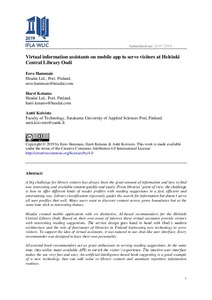Virtual information assistants on mobile app to serve visitors at Helsinki Central Library Oodi
Hammais, Eero; Ketamo, Harri; Koivisto, Antti (2019)
Hammais, Eero
Ketamo, Harri
Koivisto, Antti
IFLA
2019
All rights reserved. This publication is copyrighted. You may download, display and print it for Your own personal use. Commercial use is prohibited.
Julkaisun pysyvä osoite on
https://urn.fi/URN:NBN:fi-fe202001314176
https://urn.fi/URN:NBN:fi-fe202001314176
Tiivistelmä
A big challenge for library visitors has always been the great amount of information and how to find new interesting and available content quickly and easily. From libraries’ point of view, the challenge is how to offer different kinds of reader profiles with reading suggestions in a fast, efficient and entertaining way. Library classification rigorously guides the search for information but doesn’t serve all user profiles that well. Many users want to discover content across genre boundaries but at the same time stick to interesting themes.
Headai created mobile application with six distinctive, AI-based recommenders for the Helsinki Central Library Oodi. Based on their own areas of interest, these virtual assistants provide visitors with interesting reading suggestions. The service design goes hand in hand with Oodi’s modern architecture and the role of forerunner of libraries in Finland harnessing new technology to serve visitors. To support the idea of virtual assistants, it was natural to use chat-like user interface. Every recommender was designed to have their own personality.
AI-assisted book recommenders act as great enthusiasts in serving reading suggestions. At the same time, they utilize many available APIs to enrich the visitor’s experience. The intuitive user interface makes the use very fast and easy. An artificial-intelligence-based book suggesting is a good example of a new technology that can add value to library content and automate repetitive information routines.
Headai created mobile application with six distinctive, AI-based recommenders for the Helsinki Central Library Oodi. Based on their own areas of interest, these virtual assistants provide visitors with interesting reading suggestions. The service design goes hand in hand with Oodi’s modern architecture and the role of forerunner of libraries in Finland harnessing new technology to serve visitors. To support the idea of virtual assistants, it was natural to use chat-like user interface. Every recommender was designed to have their own personality.
AI-assisted book recommenders act as great enthusiasts in serving reading suggestions. At the same time, they utilize many available APIs to enrich the visitor’s experience. The intuitive user interface makes the use very fast and easy. An artificial-intelligence-based book suggesting is a good example of a new technology that can add value to library content and automate repetitive information routines.
